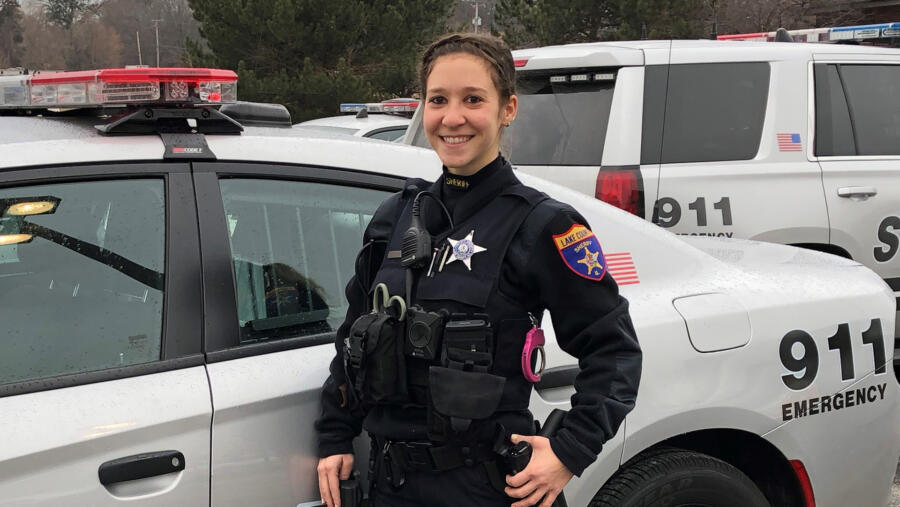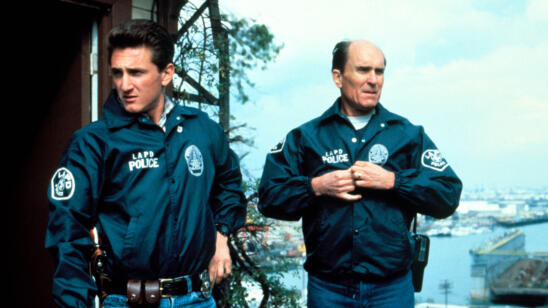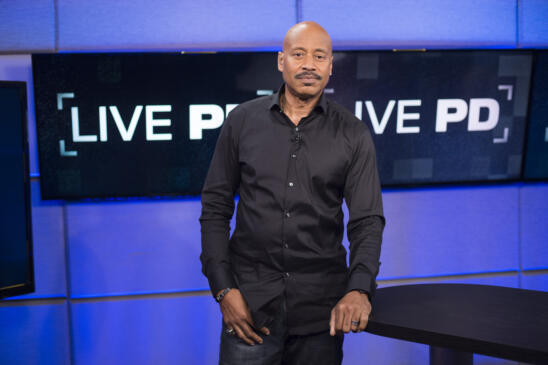Live PD fan-favorite Deputy Rebecca Loeb of the Lake County (Illinois) Sheriff’s Department shows that great cops can come in small packages.
The petite officer, who says she’s 5 feet 4 inches and weighs 100 pounds, initially caught the attention of viewers with her slight stature and signature pink handcuffs. Fans on social media quickly voiced admiration for her patience and polite, calm demeanor. But some may be surprised to learn that Loeb is a licensed attorney. She finished up her law degree while working as a cop. No big deal, right?
Loeb—who enjoys camping, the outdoors and country music in her downtime—spoke to A&E True Crime about her transition from lawyer to law-enforcement officer, the challenges and benefits of being a female in a male-dominated profession and those funky pink handcuffs.
You went to law school before becoming a member of the force. Tell us more about that.
I was halfway through law school when I got hired as a police officer with the Libertyville Police Department, which is a different police department in this area. But I went back and I graduated.
Why did you decide to leave the legal field and join the force?
When I was growing up, my parents really stressed education. I always knew I wanted to [pursue higher] education. Everyone in my family has an advanced degree. So I started law school, and I clerked at the Cook County state’s attorney’s office in the gang unit. I was working with the attorneys there who prosecute gang homicides. But I realized law enforcement was my calling. I wanted to be on the street instead of dealing with criminals six years after the actual crime happened.
I started testing [for the police department] when I was in law school, which is unheard of because law school takes so much time away from your life. But I got hired. So I took one semester off and went into the academy. Then I went back [to law school]. I worked midnights at the department and went to school during the day. I did that until I graduated. I passed the bar and everything.
Do you think having such an extensive law background helps you be a better cop?
I definitely think it helps. A lot of my coworkers consult me. I don’t give them legal advice, but when they have questions—’Can I get into this house?’ ‘Can I search this car?’ ‘What do you think is the best method for me to get a warrant?’—I offer advice to them just based on what I’ve seen. Also, because of my background and the internships I’ve had in the legal world, I see what defense attorneys like to do. I try and get ahead of the curve. It definitely helps strengthen my cases at work.
Do you find any similarities between the two professions?
I do. We work very closely with our state’s attorneys. They’re very similar [jobs], trying to put people in jail, making people pay for their crimes. I just like being on the field, putting handcuffs on people and [trying to] prevent [crime] before it happens instead of dealing with it after the fact.
What are the most common arrests you make during your shift?
We work 2:30 p.m. to 11:00 p.m., so the most common arrests are domestic batteries and DUIs related to traffic accidents.
Are those common issues in your jurisdiction in general, throughout the day?
I think they’re more common just because of the timeframe that we work. [During that shift] people are coming home from work around 6 o’clock. That’s when the domestics happen. That’s also when the roads get congested, so you have crashes. Eleven o’clock is when we end. People are going home from the bars or going to the bars. It’s the busiest shift in one of the busiest districts.
Are there certain kinds of crimes that happen more often in your area during the holidays?
I think there are more domestics around the holidays because people get together with their family and alcohol starts flowing. Then there are definitely more retail thefts around the holidays, unfortunately, because people are trying to get their families gifts and they don’t have money, which is sad.
Fans of Live PD have noticed your pink handcuffs. What’s their significance?
I’m not the only deputy at the sheriff’s office who has them. There are other females who have pink handcuffs there. I have seen males with them, too.
Being a police officer, there’s a very strict uniform code. You have to wear the right shirt and the right pants and shoes. It’s a paramilitary environment. But they allow us to use any handcuffs we want that are law-enforcement approved.
At the end of the day, I’m still a girl. I still like pink. I can still have a little girly side of me [while in uniform], so I have my pink handcuffs.
The people I arrest in them don’t usually notice that they’re pink until they get to the jail, because their hands are behind their back.
Women comprise only about 13 percent of total police forces around the country. Why do you think more women don’t go into law enforcement?
It’s a male-dominated field. It always has been. And I think that it always will be because women don’t want to break into the field.
I don’t know the [exact] numbers at the sheriff’s office, but we have so many great women in our agency, [including in] command staff positions. I’m fortunate enough to work in an agency that really values women. They give us opportunities. I’ve been to a lot of training that’s specific to women: pistol training for the female law-enforcement officer, ground fighting for the female law-enforcement officer. All those trainings have really shaped me into a better cop.
But it’s tough. You have to go to the academy. You have to do everything that everyone else does. They don’t cut you a break, and they shouldn’t just because you’re a girl. But you have to prove yourself. I’m living proof that the smallest girl can be a cop.
Do you face any challenges as a female cop?
Not so much anymore. In January it will be four years that I’ve been a cop. Being small, you have to prove to your coworkers that you can do the job just as well as they can. But once I got over that hurdle, my coworkers treated me the same as they would anybody else.
There are benefits to being a female. When you respond to sexual assaults and the victim is a woman, a lot of times they don’t want to talk to a guy.
What’s been your most memorable or unusual arrest so far?
My most memorable arrest was a DUI. I was following a car that was all over the road. It was almost driving into oncoming traffic. I set up my squad camera. I hit my lights. We’re on a really well-lit road. I see the car slam on its brakes. Clear as day, I see the driver jump into the back seat and the passenger jump into the driver seat.
I go up to the car and I introduce myself. I ask them what they just did. The driver, who is now sitting in the back seat, looks at me like I’m the biggest idiot in the world, like ‘I don’t know what you’re talking about? We didn’t just switch seats.’
He said he was in the back seat looking for his phone. But it was all on my camera. It turns out, the driver had just shot up heroin and had a bunch of heroin on him. The girl—who he had coaxed into getting into the driver’s seat—had a bunch of cocaine on her, and she had just snorted cocaine. So I actually arrested both of them for DUI. I asked her, ‘If I let you go with a warning, what will you do right now?’ She said, ‘I’ll drive away.’ In Illinois, you can be arrested for DUI if you’re in actual physical control of the vehicle, which she was. So I got two DUIs out of one car—which is rare—I got some heroin and some crack [from the bust], and the guy had a warrant.
Why do you think America is fascinated by Live PD?
I think it’s the real-time ability to comment on what’s going on on the show and to be able to ask questions and interact with the officers on the show. I think that interaction is making people want to go into the field, making people want to be cops and meet cops. It’s what we need now.
What do you love best about being a cop?
I know it sounds cliché, but every day is different. You don’t go to a job and sit at a desk and shuffle paper around. Every day I go to work, it’s something completely different. I’ve never had the same day twice. It’s never boring. It’s really such an experience—you can’t even make up the things you encounter.
Do you ever plan to go back to being an attorney?
Maybe someday. I do continuing education every year so I keep my license current. But, for now, I have too much fun as a cop. I would do this job for free. There’s no other job where you can have this much fun. I don’t want to be a lawyer anytime soon.
Related Features:
Sgt. ‘Sticks’ Larkin’s Top 5 Most Unusual Arrests
Officer Alyssa Wright on Taking Down Suspects—Two at a Time
Sgt. Denver Leverett on His K-9 Partner Flex and the Unexpected Places People Stash Drugs


